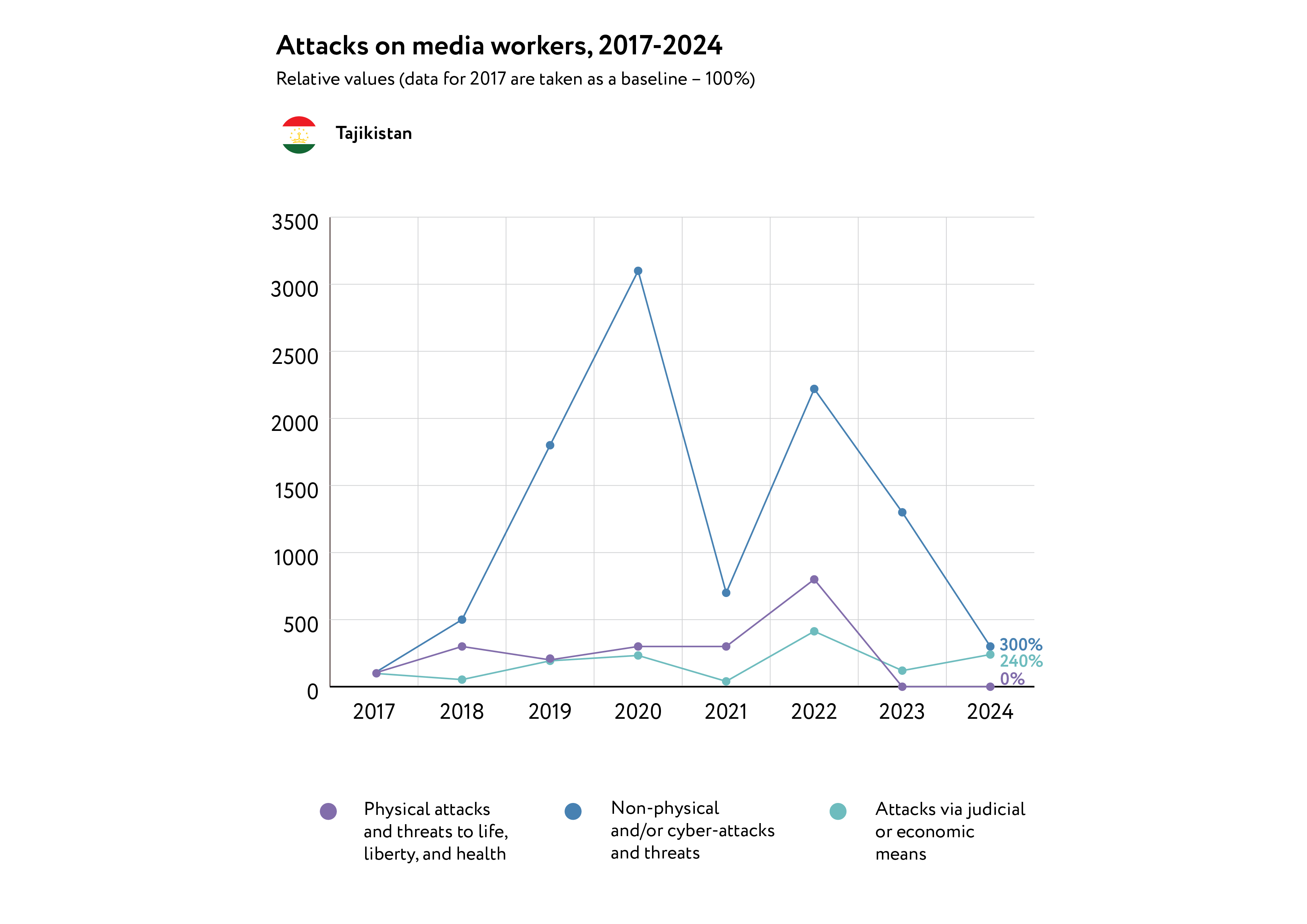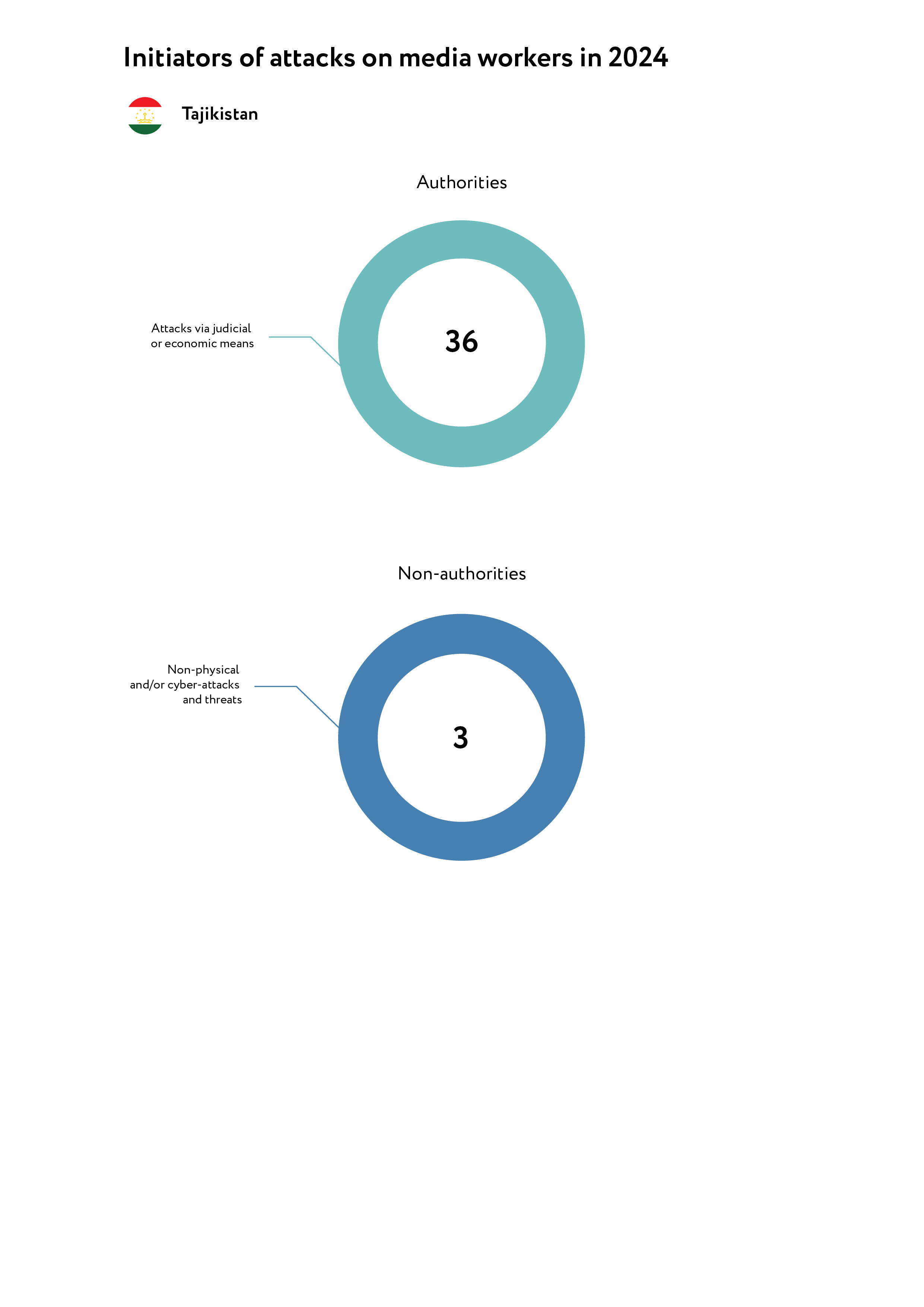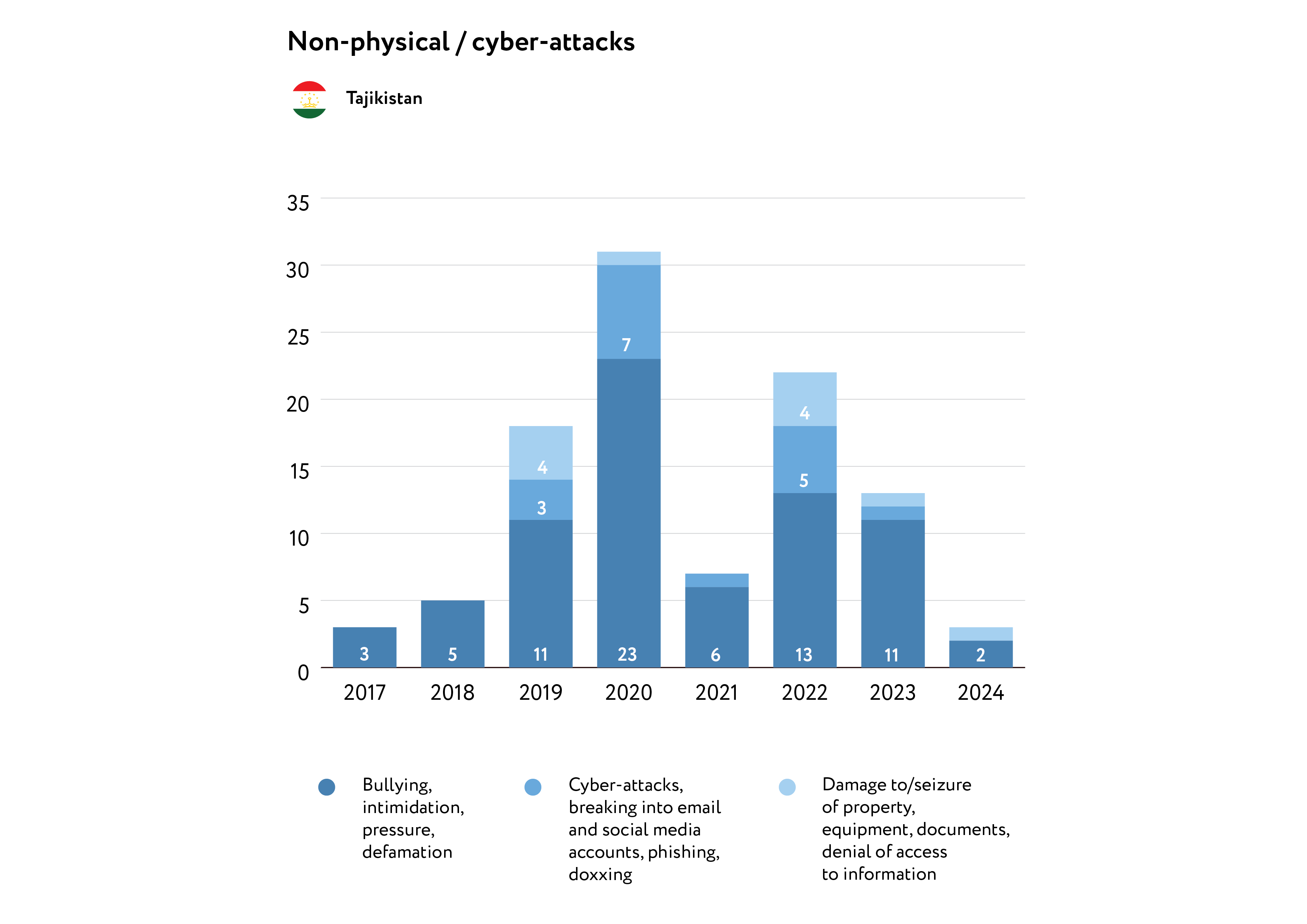PHOTO: Ahmad Ibrohim, the founder and editor-in-chief of the newspaper Paik
1/ KEY FINDINGS
Thirty-nine attacks/threats against professional and civil media workers, and editorial offices of traditional and online media outlets were identified and analysed in Tajikistan in the course of our study for 2024. Data for the study were collected using content analysis from open sources in three languages: Tajik, Russian and English. The report also includes previously undisclosed facts collected through expert interviews.
It should be noted that many incidents of pressure being put on media representatives are not made public, as this poses a threat of further repression and pressure. This significantly affects the results of the monitoring. Some of the names of journalists available to the authors of this report are not indicated in the report, for their safety and the safety of their families. A list of the main sources is provided in Annex 1.
- The total number of registered attacks on journalists and media workers increased in 2024 to 39 cases, from 31 In 2023.
- The vast majority of these attacks (92% or 36 cases) came from government officials.
- These attacks were carried out principally using judicial and/or economic means (36 cases). The remaining three cases are related to attacks and threats of a non-physical nature and/or cyber-attacks.
- As in the previous year, no physical attacks on media workers were reported in 2024.
- Most of these attacks (34 cases) took place in the capital of Tajikistan, Dushanbe; while five were recorded in the Kulob (Khatlon region).
2/ THE POLITICAL SITUATION AND THE MEDIA IN TAJIKISTAN
Tajikistan ranked 155th in the 2024 annual World Press Freedom Index published by the international NGO, Reporters Without Borders (RSF), two points lower than its position in 2023. The authorities are becoming ever more repressive, which is leading to an increase in self-censorship by journalists.
Major developments are related to the political situation in Tajikistan. Two trials of journalists began at the end of 2024 and are still continuing. Both trials are classified, meaning that the media is unable to monitor the progress of the hearings or publish any updates, even with reference to official sources.
The first trial, alleging an attempted coup in Tajikistan, is taking place in Dushanbe. According to Radio Ozodi, the defendants are Saidjafar Usmonzoda, a former head of the Democratic Party and an ex-member of parliament; Hamrokhon Zarifi, former Minister of Foreign Affairs; Shokirjon Khakimov, deputy chairman of the Social Democratic Party; Abdulfaiz Atoi, former head of the information, press, analysis and planning department of the Ministry of Foreign Affairs; and journalist Akhmadshoh Komilzoda. Another journalist, Rukhshona Khakimova, is also involved in this case; she is accused of treason and of transferring data to a foreign state, and is under recognizance not to leave the country.
The indictment refers to her research focused on Tajik-Chinese relations. Several experts and journalists took part in the study, citing exclusively open data. None of the study participants had access to any classified information which might appear in the charges brought against Khakimova.
Some of the journalists interviewed by Rukhshona were subsequently interrogated by the authorities. At least one of them was forced to leave Tajikistan due to pressure. The only reason Khakimova herself is at liberty (albeit under house arrest) is because she is the mother of two small children.
The second trial is the case of Ahmad Ibrohim, the founder and editor-in-chief of the newspaper Paik, the only independent newspaper in the Khatlon region (the largest in Tajikistan). This is taking place in Kulob. At the end of 2024 the result of this trial was still unknown. The journalist has been in custody since 12 August 2024, on charges of “bribing an employee of the State Committee for National Security”. Later, two new charges were added to his case: extortion and extremism.
According to Reporters Without Borders, at least eight journalists are currently imprisoned in Tajikistan. These are: Abdusattor Pirmuhammadzoda, Ahmad Ibrohim, Abdullo Gurbati, Daler Imomali, Khikmatullo Saifullozoda, Khurshed Fozilov, Khushruz Chumyaev and Zavkibek Saidamini.
The following media workers are also serving sentences in Tajik prisons:
- Journalist and human rights activist Ulfathonim Mamadshoeva, sentenced in 2022 to 21 years in prison. A criminal case was opened against Mamadshoeva under eight articles of the Criminal Code, including “public calls for the overthrow of the government”.
- Journalist and ex-state security officer Muhammadi Sulton, sentenced in September 2022 to seven years. He was found guilty of public calls for violent change of the constitutional order using the media or the Internet (Part 2 of Article 307), and of insulting a government official in the media or on the Internet (Part 2 of Article 330 of the Criminal Code of the Republic of Tajikistan).
- Independent journalist and first deputy of the Democratic Party of Tajikistan, Akhmadshoh Komilzoda, is being held in a pre-trial detention centre for the duration of his trial.
3/ GENERAL ANALYSIS OF ATTACKS
Pressure on journalists and media workers has intensified in 2024. Most of the recorded attacks (93%) were initiated by representatives of the authorities. Of the 39 recorded cases, 36 involved the use of judicial and/or economic means. Journalists and bloggers have faced charges of treason, extremism, the violation of public values and extortion. Many trials take place behind closed doors, thus their details remain unknown.

As in previous years, journalists are being continuously harassed. Moreover, media workers themselves are actively involved in the harassment. These attacks are based on the narrative that raising topics about gender stereotypes and feminism goes against the country’s values and corrupts Tajik society.

In 2024, one case of forced emigration was registered. A study which was conducted by the before-mentioned journalist, Rukhshona Khakimova, formed the basis of the indictment against her, and all of the respondents who took part in her survey were put under serious pressure. As a result of this, at least one media worker was forced to leave Tajikistan amid threats of arrest and confiscation of funds from their bank accounts.
4/ PHYSICAL ATTACKS AND THREATS TO LIFE, LIBERTY AND HEALTH
As of 2023, no physical attacks on media workers were recorded in 2024. However, this does not indicate that there were no cases of physical pressure. Most likely, none were registered because journalists were unable to report them, due to arrest or imprisonment. Since many cases are tried behind closed doors, it is not known what is being said during hearings.
5/ NON-PHYSICAL AND/OR CYBER-ATTACKS AND THREATS
In 2024, three cases of attacks were registered in this category. Journalists and media workers do not always report such incidents, as they tend to consider them less significant than other types of pressure.

- On September 24, the media outlet Asia-Plus published an article about a complaint from Dushanbe resident Jamshed Aminov about illegal gatherings at Lyceum No.5, where his child is studying. The prosecutor’s office confirmed the evidence specified in the complaint and recommended that the principal of the Lyceum be subjected to disciplinary action. Before publication, on September 20, a journalist from Asia-Plus arrived at the Lyceum and tried to obtain a comment from the Principal, Bibisafiya Narzieva, and the Deputy Director, Faizali Sadykov. However, the leadership of the Lyceum not only refused to communicate with the journalist but also prevented legal photography.
- On September 26, the editorial office of Asia-Plus filed a complaint with the Department of the Ministry of Internal Affairs of the city of Dushanbe against Sadykov, for insults and threats towards its journalists. That day, a group of more than 20 parents of Lyceum students and teachers, including Sadykov, had come to the Asia-Plus office. Sadykov demanded that the complaint against the Lyceum which had been published be removed, and when staff refused, he began to insult journalists and threaten the editorial staff with physical violence.
- On December 22, Mehrangez Tursunzoda, a journalist from Your.tj, was harassed on social media after the publication of her material about unpaid women’s labour. Her work, which addresses gender inequality, has drawn a barrage of negative comments, including threats. Ordinary citizens and journalists, as well as experts collaborating with various media outlets, were involved in this. She was harassed on the social media pages of the Tajik service of Radio Liberty – Radio Ozodi.
6/ ATTACKS VIA JUDICIAL AND/OR ECONOMIC MEANS
The number of attacks via legal and/or economic mechanisms doubled from 2023 to 2024, from 18 to 36 such incidents. As in previous years, this method of applying pressure is still common. All the recorded attacks came from government officials.

Journalists regularly face accusations of extremism, treason and violating morality. Such incidents include:
- On June 15, Akhmadshoh Komilzoda, an independent journalist and first deputy of the Democratic Party of Tajikistan, was detained in Dushanbe. Twelve days later, an anonymous source in the Tajik security forces told Radio Ozodi that Komilzoda was being held in a pre-trial detention centre. Another source close to the Prosecutor General’s Office of Tajikistan confirmed the detention, adding that on June 16 a search was carried out in the journalist’s home and his computer and phone were seized. According to the information available, Komilzoda is accused of “attempting to seize power by force” (Article 306 of the Criminal Code).
- On August 12, law enforcement agencies in the Khatlon region detained Ahmad Ibrohim, editor-in-chief of the independent weekly newspaper Pike, at his workplace. He is still in custody. Ibrohim is accused of bribing a civil servant under Article 320 of the Criminal Code of the Republic of Tajikistan. Later it became known that two more charges had been applied in Ibrohim’s case: “extremism” and “extortion”. His case has become a symbol of the pressure being put on independent media. The trial took place behind closed doors with the public having minimal access to any information. It is still not known whether the trial was over by the end of 2024, and if so what the outcome was. Sentences in criminal cases are classified and are not published on the Supreme Court website.
- On November 22, it became known that Rukhshona Khakimova is accused of “high treason” (Article 305 of the Criminal Code). The case was initiated by the Prosecutor General’s Office of Tajikistan in July 2024 as part of a wider allegation of “an attempted coup”. The trial is being held behind closed doors, so neither the media nor the public know the details. Khakimova is being kept under house arrest, because she has a baby. Her documents, both her internal ID and her passport, have been confiscated. She came under pressure from the authorities for conducting a study of Tajik-Chinese relations, in which at least 15 journalists and experts took part. Almost all of those who took part have been interrogated by the authorities.
Over the past few years, Tajik bloggers have been subjected to pressure from law enforcement agencies even for apparently innocent content, but which the security forces and the public classify as an “insult to public values” and a “violation of morality”:
- On January 17, the 19-year-old blogger, Jahongir Rakhimzoda, was sentenced to seven days of administrative arrest for “disobeying the lawful demands of police officers” (Article 479 of the Code of Administrative Offences of the Republic of Tajikistan). Claims arose against him in connection with his jokes on social media, which authorities regarded as offensive to Tajik culture.
- On February 17, Rahimzoda and his fellow blogger, 18-year-old Anisa Ruzieva, were detained for their humorous videos on social media. Rahimzoda received a further administrative arrest, this time for ten days, while Ruzieva was sentenced to a fine of 720 somoni (approximately $65). The charge was issued for “failing to comply with the lawful demands of police officers”. The authorities considered the bloggers’ videos offensive and disrespectful towards the cultural values of the Tajik people.
- On February 19, blogger Khabibullo Khimmatzoda was detained for publishing videos on social media which, the authorities say, are unethical and obscene. A case was opened against Khimmatzoda for “disobeying the lawful demands of police officers” (Article 479 of the Code of Administrative Offences). The court sentenced him to seven days of administrative arrest.
In 2024, the practice continued of searching media workers’ phones and other equipment with no legal foundation. In such cases law enforcement officers are looking for subscriptions to prohibited channels and pages on social media. At least three journalists have been subjected to such searches without a warrant from the court. Furthermore, it is the journalists who have had to provide written notes explaining their actions.
One case was recorded in 2024 of forced dismissal from a place of work for expressing a vocal political or social position:
- On October 21, journalist Abdukodir Talbakov reported that he had been forced to write a letter of voluntary resignation at the Institute of Philosophy of the National Academy of Sciences of Tajikistan. Talbakov is an active user of social media, and many of his posts are devoted to social issues. He also often engages in heated discussions with young people, describing them as “radically minded”. His employer stated that such activities were unacceptable and the journalist was forced to resign.
As in previous years, persecution continued of relatives of journalists who have left Tajikistan. Also, at least one journalist was forced to leave the country as a result of such pressure:
- On February 2, the mother of Tajik journalist Anora Sarkorova was summoned to the Department for Combating Organized Crime of the Ministry of Internal Affairs of Tajikistan. She was informed that a criminal case had been opened against her daughter, who lives in Europe, but it wasn’t specified under which article. Previously a criminal case had also been opened against Sarkorova’s husband, journalist Rustami Joni. Sarkorova is a former journalist for the BBC Russian Service, and Joni is a former editor of Radio Imruz and its print version. They actively reported on the events in Gorno-Badakhshan Autonomous Province in 2022. Sarkorova’s mother has been summoned by the security services and the police on several occasions in the past.
- In August 2024, an independent journalist (whose name cannot be disclosed due to possible prosecution of his relatives) was forced to leave Tajikistan after his bank accounts were seized. He began to be put under pressure after he participated in a research project which was interpreted by the authorities as a threat to national security.
ANNEX 1: OPEN SOURCES USED FOR GATHERING DATA (TAJIKISTAN)
- Asia-Plus – an independent news agency of Tajikistan;
- Committee to Protect Journalists (CPJ) – an international non-governmental organisation that defends the rights of journalists;
- Eurasianet – an independent news organization that covers news from and about the South Caucasus and Central Asia, providing on-the-ground reporting and critical perspectives on the most important developments in the region;
- Fergana News Agency – a resource covering events in Central Asia;
- Radio Ozodi – the Tajik service of Radio Liberty.
- Reporters Without Borders – an international non-profit, non-governmental organisation that conducts political advocacy on issues relating to freedom of information and freedom of the press.
- Other open-source media in the Tajik, Russian, and English languages are accessible on the internet network, as well as social networks.
